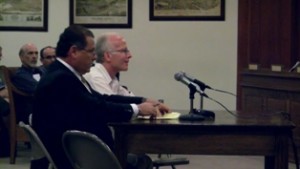
Dunkin’ Donuts Franchisee Stan Furash testifying for a Fair Franchise hearing in Massachusetts on June 29th 2011.
Stan Furash was operating two Dunkin’ Donuts franchises in Bradenton, Florida when, in 2009, Dunkin’ terminated his franchise agreement. “Dunkin Brands terminated us because they claimed my wife abandoned the business, which to me was a farce because the shops were doing better than ever before, and there was no mention of abandonment in the franchise agreement, besides there are many successful franchisees that operate in multi-states. Our situation was better than that because I was paying attention to these two shops every day.”
Furash says while he ran the two stores he increased annual revenue from $1.5 million to over $2 million and couldn’t understand why he was being targeted. He fought the termination, draining his savings to pay the associated legal fees. In the end he lost because he says, “The deck was stacked against me, and they held all the cards.”
Furash was ultimately forced to shut the doors and turn off the lights. “Our bank foreclosed as we could no longer pay the bills. Forty good people were put out of work. My financial situation is a disaster. At 57 years old I am forced to start over. We have little or no ability to pay for our children’s college andhave to start saving for retirement at a very late age. It still doesn’t make sense to me.”
Watch Stan’s testimony to the Massachusetts Legislature on June 29, 2011.
Jim – Mr. Furash’s story is a sad one… if true. But his story doesn’t make sense to me. If he and his wife were really turning these stores around, and they were generate $2M in gross sales, what motivation would DD corp. have to come in and terminate him? DD would be giving up $120K+ per year in royalties and legal costs and headaches on top of that. I realize terminations happen in franchising – usually as a last resort – but for DD corp. to just swoop in and terminate this guy makes no sense. What am I missing? There must be another side to this story, or some missing facts?
Can you share any additional details?
Thanks,
Eric Stites
CEO and Managing Director
Franchise Business Review
603.433.2266
eric@franchisebusinessreview.com
Eric,
Excellent question, thank you for taking an interest.
I can assure you Stan Furash lost his 2 shops and all of the money he invested in Dunkin’ Donuts. More often stories like Stan’s never get told, I applaud Stan for his courage in testifying about his plight and telling his story. There are a number of Dunkin’ Donuts franchise owners that suffered similar fates during the years 1998-2009, most of them settled, sold their shops and walked away very often with less money than they came in with. Stan wouldn’t settle. By the time the bank foreclosed in fall of 2008, the great recession had started and there were very few buyers to pick up the shops so they closed. Some may call it bad timing.
What you are missing is that you underestimate how greed and power corrupts. Absolute power and absolute greed, absolutely corrupts.
Attorneys for Dunkin’ Brands (DBI) and in house counsel learned that by tweaking the franchise agreement over the years and by filing for termination in the federal courts they could put franchisees with equity into a precarious position which often resulted in them being able to force the franchisees to sell and for DBI to share in the proceeds. It was an ugly practice but it worked remarkably well and it was hugely profitable. Steve Caldeira the CEO of the IFA was there at the time and he fully knows what went on.
I can tell you for sure that it was not the intent of DBI to close the shops. DBI were interested in flipping the shops to another franchisee and make a huge profit in the flip. They had been successfully flipping terminated shops and earning over $100 million dollars doing so during the decade.
Nigel Travis took over as CEO in December of 2008, by the fall of 2009 he had essentially cleared house and replaced all existing top management, including Steve Caldeira and the general counsel Steve Horn. Nigel and his team went thru each and every case that were still pending and fixed what they could and settled the rest.
Negotiations for a new franchise agreement were started between the franchisees and DBI, many of the provisions that were added during the “dark days” as some call it, were returned to more reasonable terms and accepted by the franchisees and the franchisor.
This is one reason that Dunkin’ Donuts franchise owners have taken fair franchising legislation so seriously. They never want to return to the “dark days”, and even though the current management team has changed the culture at Dunkin’ Donuts for the better, there is no guarantee that this management team will prevail. State fair franchising laws such as LD 1458 that is currently under consideration by the Maine Legislature will help prevent these types of actions from ever occurring again no matter what the brand is or who owns it.
Jim Coen
Executive Director
Maine Franchise Owners Association